History of the LGBT+ Movement
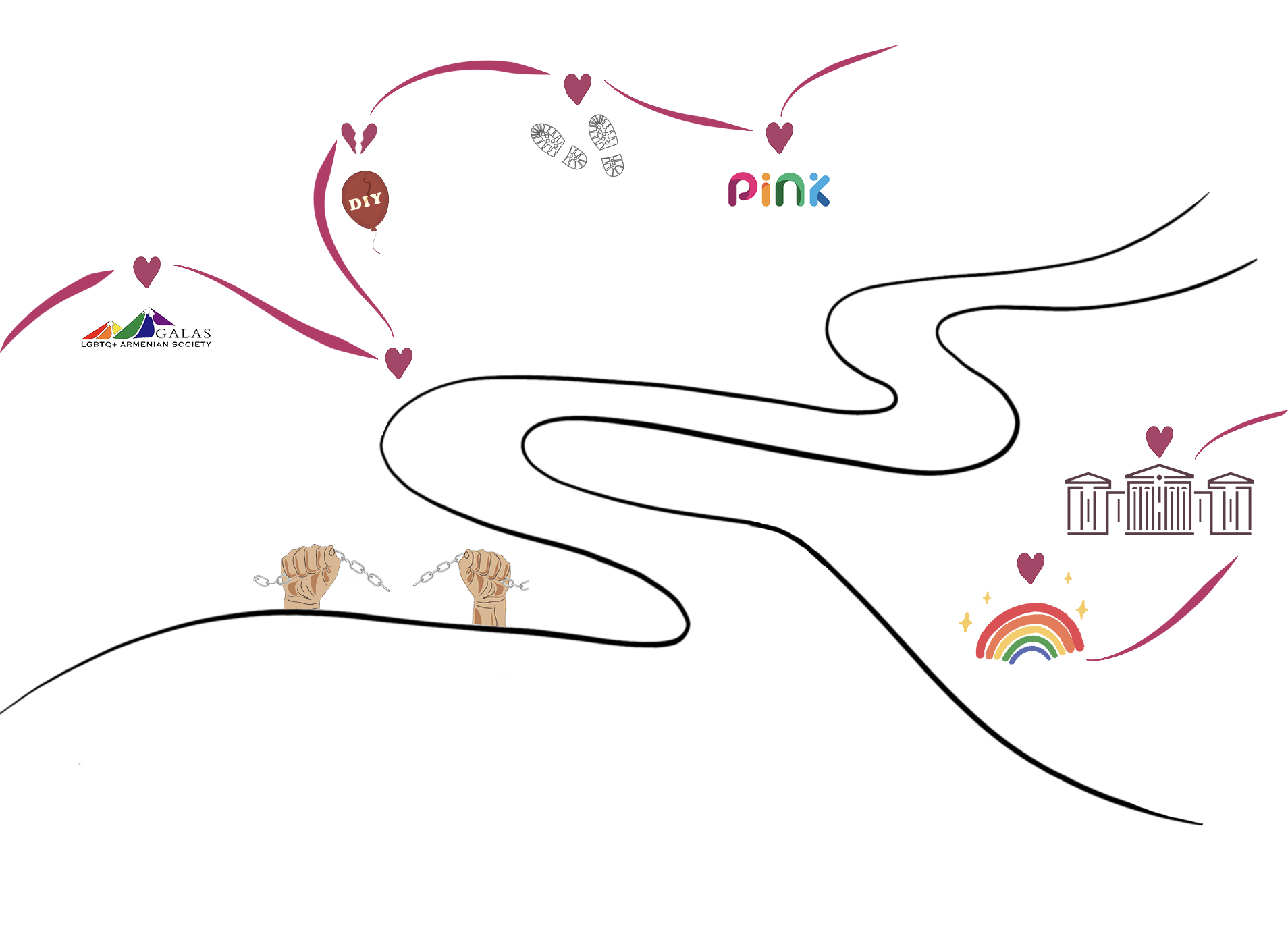
We celebrate the beginning of the LGBT+ movement in Armenia in 1998 with the founding of the first Armenian organization, GALAS in Los Angeles, which also symbolizes the institutionalization of the movement. And in 2003, the decriminalization of same-sex relations in Armenia was the first significant event and the cornerstone of the struggle for rights protection.
We present all the notable events that contributed to making the LGBT+ community in Armenia heard and developing the progress of rights protection. Those cornerstone events that have been most influential in building the movement. The highlighted events are only a part of the LGBT+ movement’s history and are not limited to them.
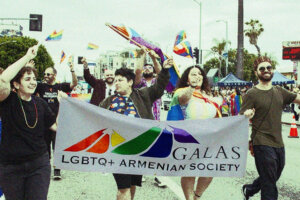
More than twenty-five years ago, a group of queer Armenians living in Los Angeles comprehended the need of establishing an organization that would develop and unite the LGBT+ community, show support and create a safe space for all. At that time, many LGBT+ Armenians were isolated from their families, friends, and even the Armenian community. Initially just a social networking platform was created, which quickly grew into a large organization called GALAS. Since 1998 it has become a leading voice for the Armenian LGBT+ community in Los Angeles and around the world.
Almost at the same time, AGLA-NY was also established in New York City, which was active until 2018. And AGLA-France operated in Paris from 2001-2007, which was an active platform not only for French Armenians, but also established Armenian information, discussions and dating websites for the LGBT+ community living in Armenia and the Diaspora, and empowering the movement. The discussions on the creation of Pink NGO also took place on the platforms of AGLA-France․
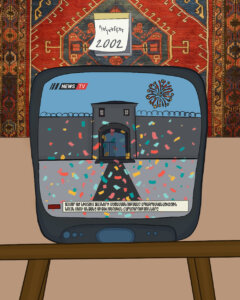
Until 2003, Armenia was on the list of countries that criminalized same-sex sexual relations. From 1920 to 1991, as part of the Soviet Union, Armenia’s legislation followed Article 121 of the Criminal Code of the former Soviet Union. Article 116, adopted in 1936, stipulated a maximum of five years in prison. Film director Sergey Parajanov was convicted twice under this article, in 1948 and 1974. The abolition of the law against same-sex relations was one of the pre-election conditions for joining the Council of Europe in 2001. In December 2002, the National Assembly approved the new criminal code, in which the article against homosexual individuals was removed. On August 1, 2003, Armenian President validated it, making Armenia the last member state of the Council of Europe to decriminalize same-sex sexual relations.
In 2001, the local “Helsinki Association” NGO published the story of a 20-year-old on its website. In 1999, the young man was sentenced to three months in prison for having sexual relations with another man. He was the last person convicted under Article 116. In his testimony, he condemned the violence and ill-treatment by prison guards.
The most recent prosecutions under the Act were seven in 1996, four in 1997, and four in 1999.
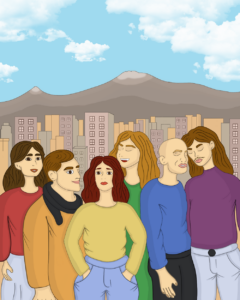
The first Armenian LGBT+ initiative group, the Gay and Lesbian Armenian Group (GLAG), was established in 2003. GLAG emerged as a pioneering effort to advocate for the rights of the LGBT+ community in Armenia, despite the social stigma and legal barriers present at the time. The group focused on creating a support network and raising awareness about the issues faced by the LGBT+ community.
GLAG’s formation marked a significant step toward fostering community and providing a platform for LGBT+ individuals to organize and discuss ways to protect human rights. The group played a crucial role in shaping the movement and helped break the silence on homosexuality in Armenia, even though wider societal acceptance was far from a reality. Many LGBT+ individuals at the time were still deeply closeted due to the risk of discrimination, harassment, and police brutality.
Although GLAG’s efforts were initially modest and faced substantial challenges, it played a foundational role in the development of LGBT+ activism in Armenia, influencing later organizations such as Pink Armenia, which continues the fight for equality.
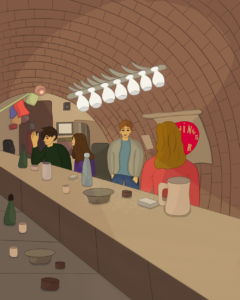
Meline’s Bar was opened in the heart of Yerevan in November 2004 which was the first and only gay bar in Yerevan, having LGBT+ people and allies as customers. They created a safe and warm space where visitors could have a good time, dance and interact with each other. The customers were both local and foreign visitors. It was also possible to meet famous singers, journalists, actors and other artists there.
In addition to the distinctive music, warm atmosphere and interesting cocktails, the bar was also known for its drag-show, which was a new wave of culture for both Armenia and the queer community.
On June 12, 2007, an announcement was posted on the Meline’s Bar website regarding the bar’s closure, stating that shows would continue at other clubs.
Later the bar was reopened by other people but in various formats. Despite the fact that the building at 30 Arami street no longer exists today, Meline’s Bar remains in the warm memories of many people.
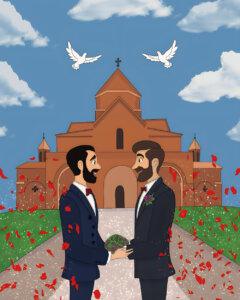
In 2006, the symbolic marriage ceremony of two men took place in Etchmiadzin Cathedral. The couple, Harut and Misha, exchanged rings at the church.
They had specially arrived from Paris to Etchmiadzin to celebrate their marriage. Getting married in the church was Harut’s idea. “I am an Armenian and I want to get married in Armenia, and as my family taught me, I want the ceremony to take place in the church.”
And so they decided to get married. Harut made the wedding rings himself, inside which was written “love and loyalty”. An Armenian newspaper published an article about their marriage, and the publication caused outrage among society and the church. In connection with that, Misha said: “I don’t care if the church or the society will approve our marriage. What’s important to me is that we chose to celebrate our love symbolically, in a symbolic place. And we did it. We did it primarily for ourselves.”

In 2007, Pink Armenia was founded in Armenia as an LGBT+ community-based non-governmental organization. Originally registered as “Public Information and Need for Knowledge” (abbreviated to PINK), the organization was renamed in 2019 as “Pink” Human Rights Defender NGO.
Established by queer people, Pink is dedicated to serving and supporting the needs of its community. Since its establishment, the organization has aimed to achieve human rights protection of LGBT+ people and ensure equality before the law.
The organization has created a sustainable and ongoing package of services for LGBT+ people whose rights have been violated on the basis of sexual orientation, gender identity or gender expression. Pink plays a crucial role in amplifying the voices of LGBT+ individuals and advocating for their rights at both national and international levels.

In December 2008, Armenia became one of the first counties in the region to endorse the UN statement against discrimination based on sexual orientation and gender identity. The statement deals with human rights abuses, directed against people because of their sexual orientation or gender identity, including violence, criminal sanctions, torture, threats against human rights defenders and discrimination in accessing economic, social and cultural rights, including the right to health.
Although the document is not binding on the member states, the statement has immense symbolic value for the UN. The signatory states reaffirm the principle of non-discrimination which requires that human rights apply equally to every human being regardless of sexual orientation or gender identity․
Armenia continues to lack comprehensive and effective anti-discrimination legislation, leaving individuals facing discrimination without access to adequate legal remedies. As a result, many instances of discrimination go unaddressed and unpunished, perpetuating a cycle of injustice.

The official launch of Pink’s Community Center in Yerevan in September 2008 was a milestone for the Armenian LGBT+ community. Establishing a safe space in the heart of Yerevan was essential for fostering a supportive environment.
During the opening event, Pink’s president emphasized the importance of the center and presented ongoing projects. At the time, Pink had already established active collaborations with both local and international NGOs, including the Norwegian Embassy in Moscow and the RA Ministry of Sports and Youth Affairs.
The Community Center remains operational and continues to be stocked with a diverse collection of literature, educational films, and informational materials. From the outset, visitors had the opportunity to participate in various trainings, film screenings, and events, make use of the library, and receive counseling services. The Center also serves as a platform for new community initiatives and ideas.
The establishment of Pink’s Community Center was a significant step forward in advancing the human rights of LGBT+ people, raising awareness, and improving the community’s well-being.
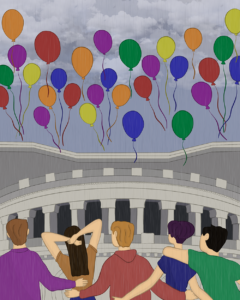
On May 17, 2010 for the first time, a public event was organized to celebrate the International Day against Homophobia, Biphobia and Transphobia (IDAHOBIT). Rainbow flashmob was organized on that day, which was held in many other countries as well. The purpose of the flashmob was to celebrate diversity, make community visible and fight discrimination.
The flashmob with colorful balloons was organized in the center of Yerevan by Pink with the partner organizations’ support. The rainy day became more beautiful when the sky was filled with colorful balloons. Balloons were flying in the sky of Yerevan, symbolizing the fight against hatred and intolerance in Armenia.
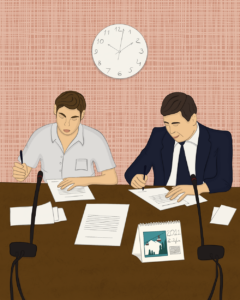
On June 4, 2011, a significant event in Armenia’s LGBT+ history took place. During the Civil Society Forum in Tsakhkadzor, the Ombudsperson of Armenia and Pink signed a historic Memorandum of Understanding focused on LGBT+ human rights protection. This Memorandum of Understanding was the first official document in Armenian history to explicitly mention the terms gay, lesbian, bisexual, and transgender.
The document outlined a framework for cooperation, stating that proposals submitted by NGOs and related research would be discussed, with the Ombudsperson making legislative recommendations to the government when necessary. This cooperation laid the foundation for ongoing dialogue and advocacy for the rights and interests of queer people.
The Memorandum stands as an important milestone in Armenia’s continued struggle for equality and human rights.
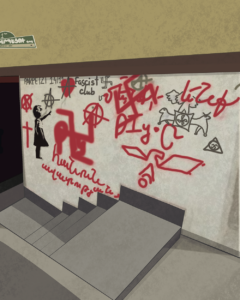
The attack on the DIY pub on May 8, 2012, once again highlighted the deep-seated hatred towards the LGBT+ community in Armenia. Young men, later identifying themselves as extremists, broke into the bar, threw a Molotov cocktail inside, and caused an explosion.
The bar was a welcoming space in Yerevan, frequented by a diverse crowd, including LGBT+ people.
Although the bar suffered extensive damage, no one was physically harmed. The police arrived only 12 hours after the incident and launched an investigation. The attackers were soon arrested and openly admitted that their actions were motivated by hatred toward the LGBT+ community.
An accelerated trial of the brothers took place in 2013. The court convicted them only of intentionally destroying or damaging property. However, they were granted conditional release through an amnesty and were freed from the courtroom.
On May 17, 2022, the European Court of Human Rights ruled that Armenia had failed to properly investigate the case and had not adequately protected the victims from an attack motivated by sexual orientation.
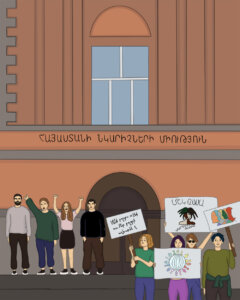
The Diversity March, organized to demonstrate the importance of cultural, national, and human diversity in Armenia, was disrupted by extremist groups who attempted to use force against the participants. The march took place on May 21, 2012. Aggressive groups chased the marchers, shouting hateful and violent slogans. The participants were forced to stop at the Union of Artists, where the “(in)valuable” exhibition was also set to take place. Accompanied by the police, the participants were forced to leave the area through the back entrance of the building.
Despite the violence and threats, the prosecutor’s office failed to pursue legal action against the extremists. The media further fueled discrimination and hatred by spreading disinformation about the event.
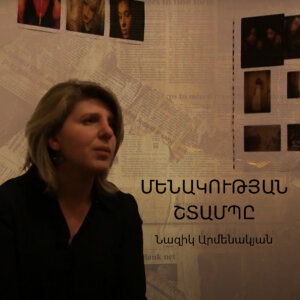
In 2013, Nazik Armenakyan’s photobook “The Stamp of Loneliness” was published, shedding light on the experiences of trans sex worker women living in Armenia.
Through her camera lens, Armenakyan captured both the vulnerability and resilience of these women as they faced social rejection, discrimination, and economic hardship. The photos offer a rare glimpse into their lives—showing them at home, on the streets, and immersed in their thoughts. The photos reflect their struggle, sadness and unshaken spirit. Armenakyan’s sensitive and delicate approach allowed the participants to tell their stories in their own way.
“The Stamp of Loneliness” is more than just a collection of images; it is a powerful social commentary. These photo stories challenged stereotypes about trans women, aiming to raise awareness of the issues they face and to amplify their voices.
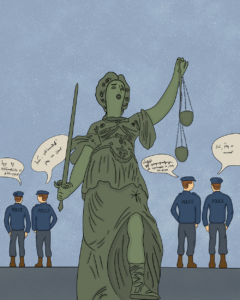
In 2013, discussions on anti-LGBT legislative proposals began in Armenia, causing serious concern among human rights defenders and non-governmental organizations. The bill was introduced by the police, based on a similar law signed by Russian President Vladimir Putin, and was proposed to protect the so-called “traditional Armenian family model.”
However, just a few days after the bill’s publication, the Armenian police halted its adoption process. The reasons for this may have been not only internal public pressure but also the reaction of Western countries and human rights groups.
In response to the growing criticism of the bill, more than two dozen prominent Diaspora Armenians signed a statement expressing their support for Armenia’s LGBT+ community. Among them were poet Diana Der Hovanessian, filmmaker Atom Egoyan, actor and producer Arsinée Khanjian, musician Serj Tankian, and photographer Scout Tufankjian. This collective action by Armenian artists, intellectuals, and professionals emphasized the importance of making a public statement, considering the potential dangers posed by the bill’s adoption.
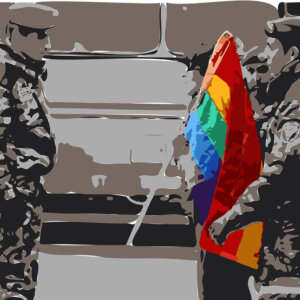
On December 2, 2013, several hundred protesters gathered in the central streets of Yerevan to oppose the ruling regime, Putin’s visit to Armenia, and President Serzh Sargsyan’s decision to join the Customs Union. Activists held banners with slogans such as “Putin, go home” and “Sovereign Armenia.” As a result, many protesters were arrested.
Most of the protesters were young activists, carrying the national flags of Armenia and Ukraine to show solidarity with the Ukrainian citizens’ resistance.
During the protest, Lala Aslikyan also waved the rainbow flag of the LGBT+ movement in protest against Putin’s anti-LGBT stance. For this reason, a group of extremists attacked Aslikyan, attempting to seize the flag and demanding its removal. After the protest, police followed Lala Aslikyan and Sevak Kirakosyan, detaining them along with other activists.
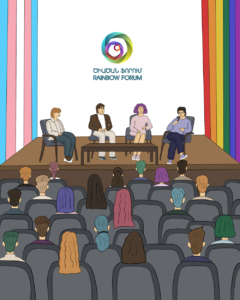
In October 2015, the Rainbow Forum was held for the first time in Armenia, marking a breakthrough event for the establishment of the LGBT+ movement.
Pink took on the responsibility of organizing the forum. Queer people and allies gathered in one place to discuss various issues related to the community. During those two days, the participants addressed strategies for combating hatred and discrimination, while also exploring how to build a sustainable LGBT+ movement in Armenia.
After the release of the public photo, hate-driven media and anti-gender groups targeted the participants and the organization for an extended period, but this did not prevent the preparation of the next forum or the planning of future activities.
What started as a one-time event has now become the largest and most significant annual queer-activist event in Armenia, with participation growing every year, reflecting the increasing strength and resilience of the LGBT+ movement in the country.
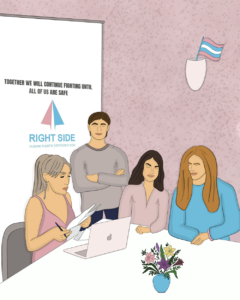
“Right Side” Human Rights Defender NGO is the first trans-led organization in Armenia that protects the rights of trans people and sex workers, helps the community overcome challenges, and provides opportunities to live with dignity.
Founded in 2016 by trans activist Lilit Martirosyan, the organization has also established a community center in Yerevan, where visitors can participate in social and educational activities and access various services. The organization continuously advocates for legal gender recognition and the protection of health and other rights of trans individuals.
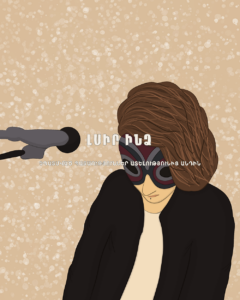
“Listen to Me. Untold Stories Beyond Hatred” documentary presents the struggle of Armenia’s LGBT+ community and the reality that queer people have to face while living in a discriminatory society. In the film, ten LGBT+ individuals share their personal experiences, shedding light on their childhood, identity and family relationships, challenging negative stereotypes about LGBT+ people.
The premiere of the documentary film took place on October 11, 2016, at the Center for Armenian Center for Contemporary Experimental Art, after which it was screened in various countries and participated in many international festivals.
The Cinematographers Union of Armenia censored the documentary “Listen to Me” and cancelled the out-of-competition program of the 14th Golden Apricot International Film Festival because of this and another queer film. Later, the film was selected in the programs of Arpa International Film Festival (USA) and Pomegranate Film Festival (Canada), which are very prestigious in the diaspora.
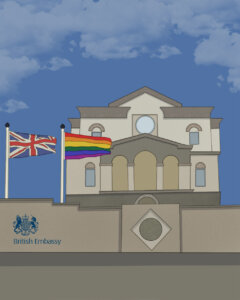
On May 17, 2017, the British Embassy in Yerevan became the first institution to raise the rainbow flag in recognition of the International Day against Homophobia, Biphobia, and Transphobia. This move, which expressed solidarity with the LGBT+ community, was highly praised by queer activists and community members. Although the flag was raised by a foreign embassy, it marked an unprecedented and symbolic moment in the heart of the Armenian capital.
While some groups perceived the raising of the flag as a challenge to “traditional national values,” this event underscored the long road ahead before the rainbow flag can fly freely in Armenia without any obstacles.
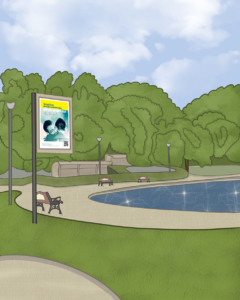
On May 25, 2017, Pink ordered the placement of three social ads on billboards in the center of Yerevan, focusing on LGBT+ themes.
On May 27, following uproar caused by some extremists on social media, the ads were removed by order of the Yerevan Municipality. Pink filed a lawsuit against the city, alleging discrimination and restriction of free speech, and demanded that the ads be reinstated.
Pink also appealed to the Ministry of Culture to have the posters recognized as social ads promoting tolerance. The ministry rejected the proposal, arguing that the public was already aware of the existence of LGBT people and that the ads did not introduce any new element of public awareness. This also became the basis for filing a new lawsuit against the ministry.
Both lawsuits dragged on for years with no clear outcome and no definitive ruling on discrimination.

On August 3, 2018, nine young people, including LGBT+ activists, were attacked in the village of Shurnukh, Syunik region. Insults and hate speech were used during the attack, indicating it was a hate crime.
More than 30 people participated in the attack, and as a result of the brutal beating, two young people sustained varying degrees of physical injuries, while the rest suffered relatively minor injuries.
The police and medical aid responded to the incident quite late, after the bloodied young people had managed to escape from the clutches of the violent mob and walked for kilometers along the road leading to Goris city. The police described the incident as an argument.
Frustrated by years of inaction from law enforcement and prolonged court battles, the young people no longer believe in justice, and two of them were forced to seek asylum in another country for their safety.

It took a lot of courage for Lilit Martirosyan to enter the Parliament hall, stand before the deputies, and speak for the protection of trans people’s rights, making history. The trans activist’s speech in the Armenian Parliament was an unprecedented event.
“I speak on behalf of the tortured, raped, burned, stabbed, killed, deported, discriminated against, poor, and unemployed transgender people of Armenia,” said Lilit Martirosyan on April 5, 2019, during a session convened by the Parliament’s Standing Committee on Human Rights Protection and Public Affairs.
It was predictable that the message would provoke the anger of some deputies and extremist groups, which later led to threats and persecution against Martirosyan.
She considers the most difficult part of her work to be raising awareness about trans people in Armenia and changing society’s attitude. Thanks to her speech, awareness of trans people in Armenia has increased but the life of trans people in Armenia is still extremely difficult.
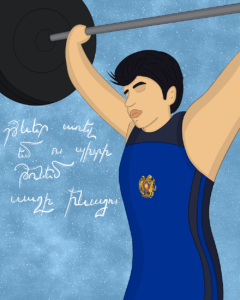
Mel Daluzyan was one of the most famous and popular athletes in Armenia. As a three-time European Weightlifting Champion, he proudly raised the Armenian flag on international platforms. However, public opinion of him shifted when his trans identity became known. Mel’s name became the subject of intense discussions after a film about his journey was being made, and in 2019, Armenia decided to provide funding for the film production. Some people accused the government of “promoting European values” and supporting the LGBT+ community. In his speech, the Prime Minister of Armenia expressed support for funding the film and stated that Mel Daluzyan was under his protection.
The documentary “Mel,” released in 2022, tells the story of Armenian weightlifter Mel Daluzyan, who not only became one of the best athletes in Armenia’s sports history but also faced a difficult personal struggle with his gender identity. The film explores his life, career, and his fight for self-acceptance and expression. The directors are Paul Cohen and Inna Sahakyan.
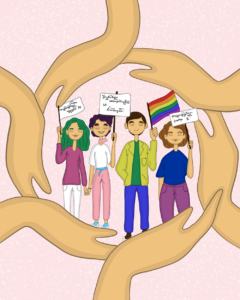
In 2020, Pink Human Rights Defender Non-Governmental Organization decided to commemorate the decades-long struggle for LGBT+ equality by declaring August 3 as the National Day to Fight for LGBT+ Rights. However, after further discussions, it was decided in 2023 to rename and officially establish the day as the National Day for LGBT+ Human Rights Protection.
This day was not chosen by chance. On August 3, 2018, a hate crime occurred in the village of Shurnukh, Syunik region, when several dozen people attacked nine young individuals due to their actual or perceived sexual orientation and gender identity.
The National Day symbolizes the long-term fight against discrimination toward LGBT+ people. It serves as a reminder that the state must fulfill its international obligations by establishing civil, administrative, and criminal measures to prevent and prohibit discrimination, ensuring the security and protection of human rights.
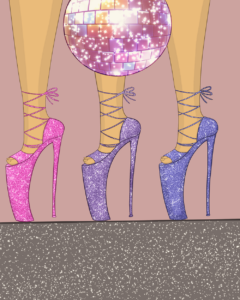
Princess Diaries parties were among the most famous and unique queer music events held in Armenia, much loved by the LGBT+ community.
The main venue for the event was Poligraf Club, where a safe platform was created for queer people to express themselves and their art. The first Princess Diaries party took place on January 7, 2021. These events also provided significant opportunities for DJs, drag artists, and other creatives for whom a safe space was essential for their artistic development. Creating an inclusive environment for Princess Diaries was the organizers’ primary goal, actively excluding and prohibiting any form of discrimination, so that everyone could fully express themselves and enjoy the event.
After Poligraf Club closed, Princess Diaries also ceased operations, but similar queer events continue under different formats and names.
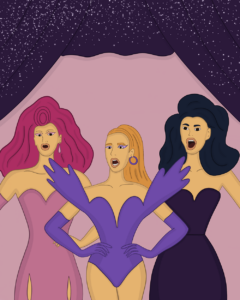
The return of drag shows in Armenia in December 2022 was a significant moment for the Armenian queer community. The most exciting part of the event, dedicated to the 15th anniversary of Pink NGO, was the unforgettable performances by drag artists, which marked the beginning of the development of this culture in Armenia.
Weekly meetings at the Pink Community Center, organized by one of the artists, Remi, provided a vital platform for self-expression and advancing drag culture. Although finding safe spaces to perform was challenging, it did not stop Gigi Aries, Leona, Lady Die, Remi Gelathoe, and other artists from creating a supportive environment and inspiring the queer community and allies.
In a short time, they gained recognition at international events. In 2023, Remi won a top prize, and several media outlets published stories about Armenian drag. In October 2024, during the Armenian awards ceremony held as part of LGBT+ History Month, Gigi received the “Spirit of LGBT+ Movement” award.
These events not only showcased the talent of Armenian artists but also became a source of empowerment for the queer community, demonstrating that despite obstacles, the community can create spaces of visibility and acceptance.
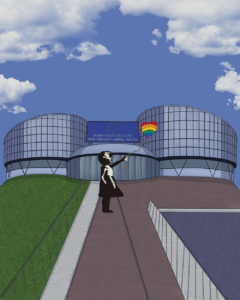
After the 2012 attack on the DIY bar, and after exhausting legal proceedings in local courts, Pink Human Rights Defender NGO applied to the European Court of Human Rights (ECHR), alleging that the authorities had failed to protect the bar’s owner, Armine Oganezova, following the attack and had not effectively investigated the complaints.
On May 17, 2022, years after the explosion of the DIY bar, the ECHR ruled that the Republic of Armenia had failed to protect the rights of Armine Oganezova.
The court, in particular, found that the state, having not taken into account Armine Oganezova’s allegations about the homophobic motives of the perpetrators, did not conduct a proper investigation of the case and did not protect the victim from discrimination on the grounds of sexual orientation.
It should be noted that this is the first case of law violation based on sexual orientation when the European Court recognized a human rights violation by the Republic of Armenia.

On April 23, 2023, the police raided the Poligraf club in an illegal operation. The incident occurred at night, around 1 am, when visitors were present in the club. According to reports, the police did not provide any legal justification for the search.
During the raid, everyone in the club was forced to lie on the floor and then taken to the police station. Employees and visitors were subjected to physical violence and humiliation. At the police station, some were forced to undress during the search, while sexist, homophobic, and transphobic comments were made. All of this had a severe psychological impact on the people. As a result, the premises were closed and sealed. A few days after the police raid, Poligraf announced its reopening, but due to continuous pressure from state institutions and city authorities, the club permanently shut its doors in January 2024.
Over its five years of operation, the club became known for its creativity, diversity, and inclusivity, serving as a safe space for many to express themselves.
